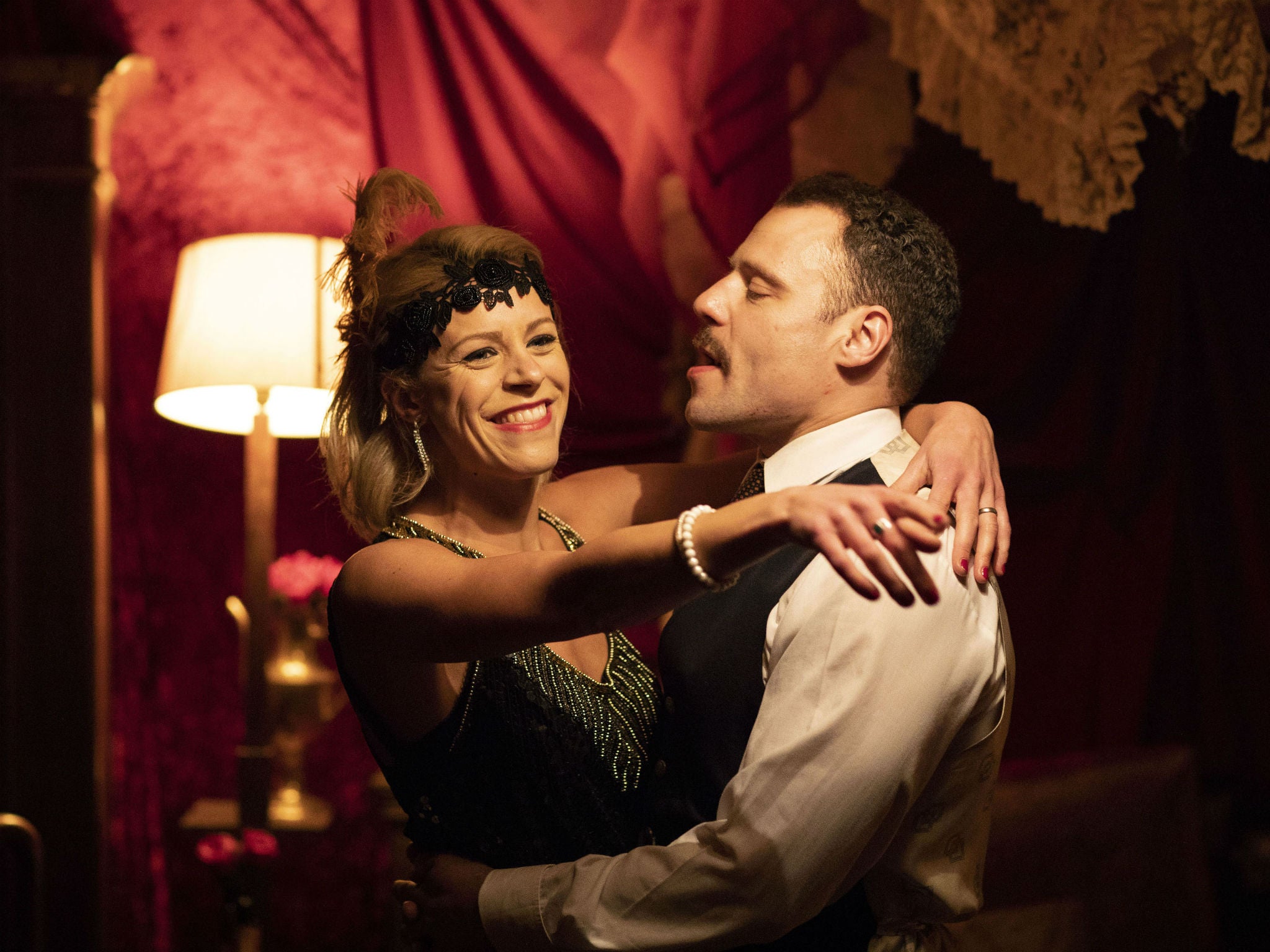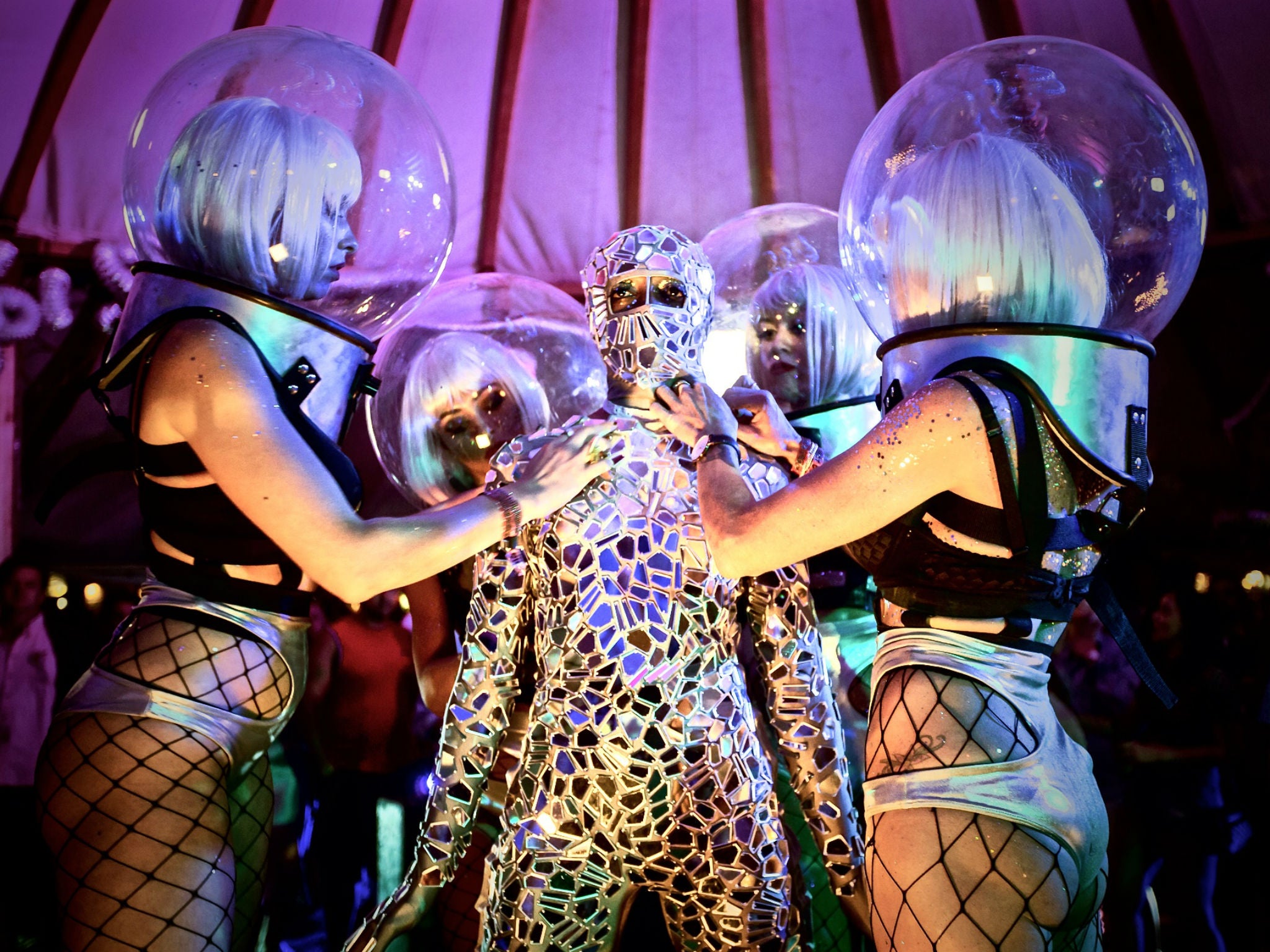Immersive theatre may be sexy – but we need to start talking about consent
After reports of audience members sexually assaulting actors, it's time the boundaries in this most hedonistic of art forms were redefined

Your support helps us to tell the story
From reproductive rights to climate change to Big Tech, The Independent is on the ground when the story is developing. Whether it's investigating the financials of Elon Musk's pro-Trump PAC or producing our latest documentary, 'The A Word', which shines a light on the American women fighting for reproductive rights, we know how important it is to parse out the facts from the messaging.
At such a critical moment in US history, we need reporters on the ground. Your donation allows us to keep sending journalists to speak to both sides of the story.
The Independent is trusted by Americans across the entire political spectrum. And unlike many other quality news outlets, we choose not to lock Americans out of our reporting and analysis with paywalls. We believe quality journalism should be available to everyone, paid for by those who can afford it.
Your support makes all the difference.“Truth or dare?” This is the challenge put to a few audience members in a game of “spin the bottle” at an immersive production of The Great Gatsby currently being enjoyed by audiences in Borough, south London.
By the end of the scene a woman had been asked about her masturbatory habits and two audience members had ridden each other around the room. And it was all enormous fun; risque, but safely and thoroughly enjoyed by everyone.
‘Truth” and “dare” are the essence of immersive theatre. It is designed to push the physical and mental boundaries of audiences and, as a result, can even become a space in which to explore new ideas about our own lives and sexuality.
Indeed, it is often sold on its implicit sense of hedonism. From Punchdrunk’s Macbeth adaptation Sleep No More, where all participants wear masks, to Secret Cinema’s recent Moulin Rouge extravaganza where attendees were encouraged to dress as “diamond dogs”, a certain sexuality has been a huge part of the success of this art form.

Over the years, I have had an actor strip in front of me in a one-on-one situation; been instructed to lie on a bed in the darkness besides a total (non-acting) stranger; and had my face, arms, hands and feet stroked by actors. This was all something I was more than happy to experience, and would hate to lose.
However, there is a conversation to be had about boundaries in immersive theatre. Recently, concerns have been raised.
Not every performance of The Great Gatsby has felt so safe: earlier this year, the police twice had to be called after audience members sexually assaulted actors; new safeguarding measures were rapidly introduced, including an extensive alarm system. Meanwhile, at Sleep No More in New York, some 17 complaints have been made by performers about inappropriate sexual behaviour from participants.
As the popularity of this art form grows, so too does our national and international conversation about consent. This is an incredibly complex area, and that goes for theatre too: traditional actors have often felt exploited and unsure when asked to participate in simulated or actual sexual activity on stage.

But boundary-blurring goes even further in immersive theatre, when the borders between audience and performer are deliberately porous, and by its very nature it include improvisation and interaction. Audiences often drive the action and it can be a physically and emotionally intense experience.
As a result, immersive theatre can allow people to explore their sexuality in new, interesting ways in what are seen as safe spaces. But some audience members have exploited this openness, while others may simply feel unsure about what is expected of them.
It is, therefore, vital that the immersive theatre community considers how they manage audiences’ expectations and ensure they feel safe even as they are feeling challenged.
And the industry is now taking stock. Owen Kingston is the venue manager for Colab Factory, which houses The Great Gatsby, as well as artistic director of Parabolic Theatre. He says it was seeing how people behaved at Gatsby that opened his eyes to the need to consider consent as a central part of the approach to immersive theatre. Too many people were leaving their scruples at the door along with their inhibitions.
“We’re in a gold rush time,” he says. “You have lots of people who are really excited to be part of [immersive theatre] and everyone is very excited about creating wonderful worlds and experiences, and that’s great. But in that rush of excitement, people aren’t always thinking things through carefully.”
Gatsby’s creators, the Guild of Misrule, have done a lot of work to protect their actors and ensure that boundaries are set – implicitly mostly, but explicitly where needed.
Amie Walker – an immersive theatre director who has previously acted in the show – says this work starts with “a bigger conversation” that empowers audiences, informing them about what to expect and how to behave before they even arrive. “It’s about devising the possibilities on offer, but also about finding ways to teach audiences the rules.”
Some companies do this more explicitly than others. For example, Asia Osborne is artistic director of ONEOHONE Theatre. Their shows often centre on intense relationships between cast and audience members. They use a system of sashes that have to be worn visibly – if you remove your sash at any time, you are removing yourself from participation in the show.

You are still able to watch (and can put it back on later), but while it is off, you are not expected to take part. And that is true too for the actors who have the same freedom to remove themselves if they need to for any reason.
Osborne says: “The whole point is that you want the audience to feel they have agency. But you’re trusting they will use that agency within a defined sphere – which is defined by the atmosphere the actors are giving off.”
Actors will ask your permission before taking things further: “May I?” is an important part of setting out the sense of boundaries for audiences.
Many theatre goers like to fantasise about a link with the actors we see on stage. We enjoy the sense of intimacy that comes with seeing emotions played out so close to us. This is exacerbated in immersive theatre when we are interacting with sometimes flirtatious characters.
Actor Peter Dewhurst, currently starring in the immersive gaming show For King and Country at the Colab Factory, says there has to be an understanding between both audience and actor that a show all takes place in character, and any interaction is absolutely not about the actor fancying an audience member. “That would be an actor not doing their job well. But that understanding is on both the actor and the audience member.”
Sophie Cohen – who runs the immersive erotic show Menagerie with her all-female company House of Kittens, which opens this week – says that those who are disrespectful would be escorted from the venue, but it’s not a problem they run up against currently. But she suggests it’s important to empower performers to use their judgement.

“We are all strong women with longstanding relationships with live performance, so we can sense pretty quickly if an audience member might be overly excited and swerve them,” says Cohen.
Osborne agrees, saying that actors make judgement calls about who is into it but not too up for it – and they are told firmly not to select anyone to satisfy their own sexual interests.
Many of the people I spoke to compared the conversations needed in immersive theatre to those you find in the BDSM, sex party or swingers communities, where enthusiastic consent must be sought with each interaction. Similarly, it is by having strict, safe parameters to operate within that people are able to truly push their boundaries.
Both require a strong sense of mutual respect and knowing the rules, but also require strict enforcement – participants must know that breaking those rules has serious consequences. As Dewhurst puts it: “We’re allowed to push things because it’s safe. [That shared knowledge] is a sign it is working.”
It is also important for there to be a proper ending to an immersive experience. Not least because actors and audiences alike tend to end up in the bar together afterwards (at which point everyone is simply an adult).
But it is vital that there is a moment where the show and the illusion is concluded. Whatever else happens, nobody is waking up with Jay Gatsby in the morning.
‘Menagerie’ is at the Kings Head in east London, 31 May and 1 June (houseofkittens.co.uk); ‘The Great Gatsby’ is booking till 30 September (immersivegatsby.com)
Join our commenting forum
Join thought-provoking conversations, follow other Independent readers and see their replies
Comments